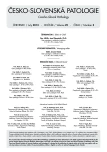-
Články
- Časopisy
- Kurzy
- Témy
- Kongresy
- Videa
- Podcasty
Polymerase chain reaction: basic principles and applications in molecular pathology
Authors: Libor Staněk
Authors place of work: Ústav patologie 1. LF UK a VFN, Praha
Published in the journal: Čes.-slov. Patol., 49, 2013, No. 3, p. 119-121
Category: Přehledový článek
Summary
Polymerase chain reaction (PCR) is a technology used for quick and easy amplifying DNA sequences, which is based on the principle of enzymatic replication of the nucleic acids. This method has in the field of molecular biology an irreplaceable role and constitutes one of the basic methods for DNA analysis. In the following article we describe the basic principles of PCR, and its importance especially in the field of pathology.
Keywords:
polymerase chain reaction – nucleic acid amplification – primers – detection of amplicons – reverse transcription
Zdroje
1. Coleman WB, Tsongalis GJ. Molecular Patology. Elsevier: USA; 2009 : 197–207.
2. Kolář Z, Bouchal J, Knillová J. Molekulární patologie nádorů. Epava: Olomouc; 2003 : 113–142.
3. Powledge TM. The polymerase chain reaction. Advances in Physiology Education 2004; 28 : 44–50.
4. Rosypal S. Úvod do molekulární biologie, díl třetí. Grafex: Brno; 1999 : 743.
5. Šmarda J, Doškář J, Pantíček R, Růžičková V, Kostíková J. Metody molekulární biologie. Masarykova univerzita v Brně: Brno; 2008 : 13–16; 73–104.
6. Konrad M. A (short) history of PCR. http://www.scienceisart.com/A_PCR/PCR history_2. html.
7. Brown TA. Klonování genů a analýza DNA. Univerzita Palackého v Olomouci:
Olomouc; 2007 : 3–12; 184–189.
Štítky
Patológia Súdne lekárstvo Toxikológia
Článek Jak se vám líbí?Článek Sekvenování nové generace
Článok vyšiel v časopiseČesko-slovenská patologie

2013 Číslo 3-
Všetky články tohto čísla
- Molekulární a personalizovaná medicína - budoucnost patologie v 21. století
- Rád se dívám na svět i jinak než mikroskopem
- MONITOR aneb nemělo by vám uniknout, že ...
- ÚVOD DO MOLEKULÁRNÍ PATOLOGIE
-
Prof. MUDr. Zdeněk Lukáš, CSc.
In Memoriam - Polymerázová řetězová reakce: princip metody a využití v molekulární patologii
- Sekvenování – klasická metodika
- Jak se vám líbí?
- Sekvenování nové generace
- MONITOR aneb nemělo by vám uniknout, že ...
- Endometrióza v mezotelovej cyste tunica vaginalis testis. Kazuistika
- MONITOR aneb nemělo by vám uniknout, že ...
- Nepravá výduť stěny žilního štěpu u pacienta s implantovaným MGuard typem koronárního stentu: kazuistické sdělení a popis mikroskopických změn
- Obrovskobuněčná intersticiální pneumonie bez souvislosti s expozicí tvrdokovům
- Praktická poznámka pro elektronové mikroskopiky
- Česko-slovenská patologie
- Archív čísel
- Aktuálne číslo
- Informácie o časopise
Najčítanejšie v tomto čísle- Polymerázová řetězová reakce: princip metody a využití v molekulární patologii
- Sekvenování – klasická metodika
- Sekvenování nové generace
- Rád se dívám na svět i jinak než mikroskopem
Prihlásenie#ADS_BOTTOM_SCRIPTS#Zabudnuté hesloZadajte e-mailovú adresu, s ktorou ste vytvárali účet. Budú Vám na ňu zasielané informácie k nastaveniu nového hesla.
- Časopisy



